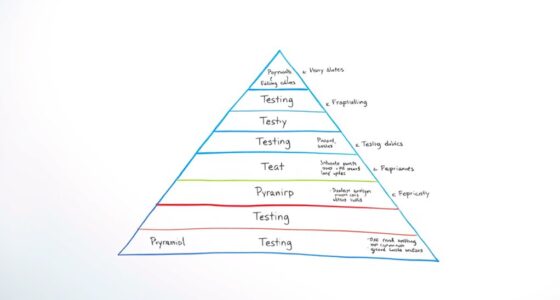The saying ‘the devil is in the details’ perfectly captures the essence of a quality assurance software engineer’s role, requiring them to meticulously focus on numerous details.
From ensuring the functionality and security of a software product to collaborating with the development team, my role in quality assurance is crucial for delivering a successful end product.
But how exactly can I fulfill this pivotal role? Let’s explore the specific skills and strategies that can empower yourself to excel in quality assurance within software engineering.
Key Takeaways
- Software engineers play a crucial role in quality assurance by establishing and executing comprehensive testing plans and procedures for software products.
- Collaboration between software engineers and development teams is essential to ensure software quality, testing, and assurance.
- Proficiency in programming languages and familiarity with automation tools are important skills for software engineers in quality assurance.
- Involvement of software engineers in quality assurance leads to early identification of defects, more robust software products, and promotion of a holistic approach to quality and ownership within the development team.
The Role of Software Engineers in QA
How do software engineers actively contribute to quality assurance processes in software development?
Software engineers play a pivotal role in ensuring software quality, testing, and assurance throughout the development lifecycle. By collaborating closely with development teams, software engineers establish and execute comprehensive testing plans and procedures for software products. They leverage their expertise to ensure adherence to industry standards and regulatory requirements, thereby upholding the highest levels of quality control in software applications.
Utilizing a combination of automated testing tools such as Selenium and manual testing practices, software engineers meticulously identify, report, and track software defects and issues. Their meticulous approach extends to documenting and communicating testing results and findings to relevant stakeholders, including developers and project managers. This seamless flow of information is critical in driving continuous improvements and refinements in technical skills related to software testing, automation, and quality assurance methodologies.
In essence, software engineers serve as the linchpin in the quality assurance and testing processes, their contributions underpinning the delivery of software products that meet the highest standards of quality and reliability.
Skills Required for QA Integration

Demonstrating proficiency in software testing methodologies and tools, along with a solid understanding of the software development life cycle and agile methodologies, is essential for effective QA integration. To be successful in this role, a QA engineer should possess the following skills:
- Proficiency in Testing Processes: A thorough understanding of different testing processes, including unit testing, integration testing, system testing, and acceptance testing, is crucial for ensuring comprehensive test coverage.
- Technical Skills and Automation Tools: Proficiency in programming languages such as Java, C#, JavaScript, or Python is essential for developing and executing automated test suites. Additionally, familiarity with automation tools such as Selenium, Appium, or JMeter is valuable for efficient test automation.
- Quality standards and Certified Software Quality: An in-depth knowledge of quality standards and the ability to ensure compliance with industry regulations and best practices, along with certification as a Certified Software Quality Test Engineer, is advantageous for maintaining high standards of software quality.
These skills, when combined with effective communication and collaboration abilities, enable QA engineers to seamlessly integrate quality assurance processes into the software development lifecycle, ensuring the delivery of robust and high-quality software products.
Benefits of Software Engineer Involvement in QA
Software engineers contribute to quality assurance processes by leveraging their in-depth understanding of software architecture and development to identify and address potential defects early in the development lifecycle. Their involvement in QA brings several benefits to the development team and the overall quality management of software products.
By actively participating in the creation and review of test cases, engineers ensure that all aspects of the software are thoroughly tested, leading to more robust and reliable products. Additionally, software engineers can contribute significantly to test automation, streamlining the testing process and enabling faster feedback loops.
Furthermore, the involvement of software engineers in QA promotes a holistic approach to quality, where the entire development team takes ownership of the quality of the software they produce. This collaboration fosters a culture of continuous improvement, where engineers can learn from QA engineers and vice versa, leading to enhanced professional development and mastery in both software engineering and quality assurance.
Ultimately, the integration of software engineers into the QA process results in higher quality software, improved efficiency, and a more cohesive and knowledgeable development team.
Practical Tips for Implementing QA

To ensure comprehensive testing coverage at all stages of the software development lifecycle, meticulous planning and strategic implementation of QA processes are essential. QA engineers play a crucial role in maintaining software quality, and here are some practical tips for implementing QA effectively:
- Implement Automated Testing: Integrate automated testing tools and frameworks to streamline and enhance testing processes, allowing for efficient and repeatable testing procedures.
- Develop Detailed Test Plans: Create and maintain detailed test plans, test cases, and test scripts to ensure thorough testing coverage and mitigate the risk of overlooking critical functionalities.
- Collaborate with Development Teams: Close collaboration with software development teams is imperative to understand requirements and provide early feedback on potential issues, facilitating a proactive approach to quality assurance.
Importance of QA in Software Engineering
In ensuring the quality and reliability of software products, the meticulous implementation of QA processes is of paramount importance. Software quality is a critical aspect of any software development process, and QA plays a pivotal role in achieving and maintaining it.
By identifying and tracking bugs, errors, and issues in the software, QA ensures that the end product meets the specified requirements and standards, thereby enhancing customer satisfaction and trust in the product. The importance of QA in software engineering can’t be overstated, as it also contributes to preventing and reducing the overall cost of software development by addressing issues early in the development lifecycle.
Moreover, effective QA processes lead to the overall improvement of the software development lifecycle, resulting in better efficiency and productivity.
For individuals considering a career in software quality, obtaining a degree or certification such as an Associate in Software Testing or becoming a Software Quality Analyst through organizations like the American Society for Quality can be beneficial for mastering the intricacies of testing and quality in the field of information technology.
Frequently Asked Questions
How Do I Become a Software Quality Assurance Engineer?
To become a software quality assurance engineer, there are several steps that need to be taken:
- Gain practical experience through internships or entry-level positions. This allows you to learn the ins and outs of the job and gain hands-on experience in software quality assurance.
- Obtain a relevant educational background in computer science or engineering. This provides you with a strong foundation in the technical aspects of the field and helps you understand the underlying principles of software development.
- Enhance your communication skills for effective collaboration. As a software quality assurance engineer, you will be working closely with other team members, such as developers and project managers. Good communication skills are essential for ensuring effective collaboration and successful project outcomes.
- Learn programming languages commonly used in software development. While not all software quality assurance engineers need to be expert programmers, having a basic understanding of programming languages like Python or Java can be beneficial for carrying out certain tasks, such as writing automated tests.
- Utilize online resources for continuous learning. The field of software quality assurance is constantly evolving, and it’s important to stay updated on the latest industry trends and best practices. Online resources such as blogs, forums, and online courses can help you stay current and continue to develop your skills.
In addition to these steps, there are other factors that can contribute to your success as a software quality assurance engineer. Acquiring certifications such as ISTQB Certified Tester or CSQA can demonstrate your expertise and dedication to the field. Understanding the software development lifecycle is also crucial, as it provides you with a framework for effectively carrying out your role. By following these steps and continuously learning and improving your skills, you can master the role of a software quality assurance engineer.
How Can I Become a Quality Assurance?
To become a quality assurance professional, we start by gaining practical experience through internships or entry-level positions.
We also obtain a relevant educational background in computer science or information technology.
Additionally, enhancing our communication skills for effective collaboration with developers and stakeholders is crucial.
It’s important to stay informed about the latest trends in software quality assurance through continuous learning and obtaining relevant certifications.
What Is the Role of Quality Assurance in Software Engineering?
The role of quality assurance in software engineering is to oversee testing and quality management to ensure software meets company and regulatory standards. This involves designing and implementing tests for performance and security, and collaborating closely with developers and quality control engineers.
Quality assurance focuses on proactive processes such as documenting, auditing, and management, while quality control focuses on reactive corrections.
Essential skills include attention to detail, communication, time management, problem-solving, and coding skills.
What Is the Qualification for Qa?
To qualify for QA, we prioritize obtaining a degree in computer science, engineering, or information technology, or consider alternative paths like coding bootcamps.
Practical experience through internships, contracts, or entry-level positions is crucial to develop technical skills and knowledge.
Additionally, strong communication and collaboration skills are essential for effective teamwork.
Consider relevant certifications such as ISTQB Certified Tester or CSQA to enhance qualifications.
Staying updated on industry trends and testing methods is vital for competitiveness.
Conclusion
In conclusion, as software engineers, we play a crucial role in ensuring quality assurance.
Just like a skilled craftsman meticulously hones their tools, we must continuously refine our skills and stay updated on industry trends to effectively integrate QA into the software development life cycle.
By doing so, we can ensure that our products meet the highest standards and deliver exceptional value to our users.









